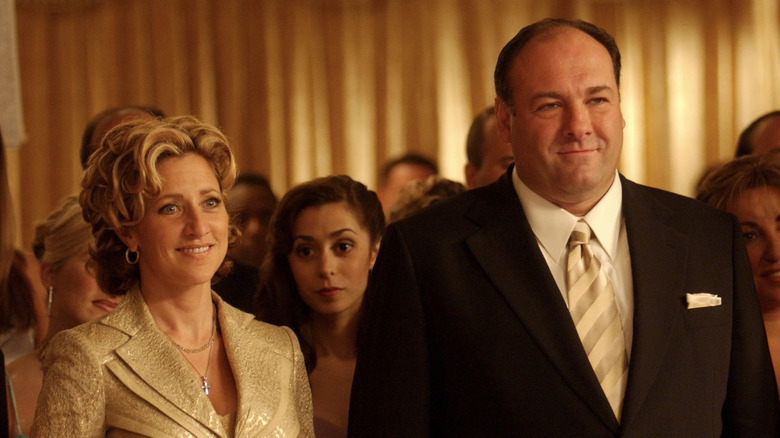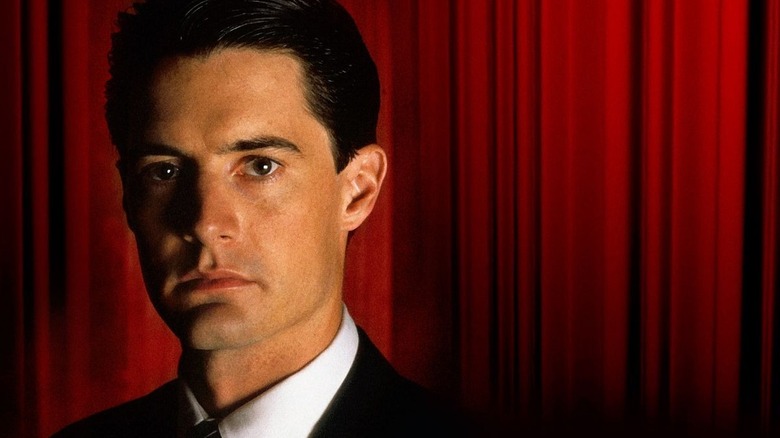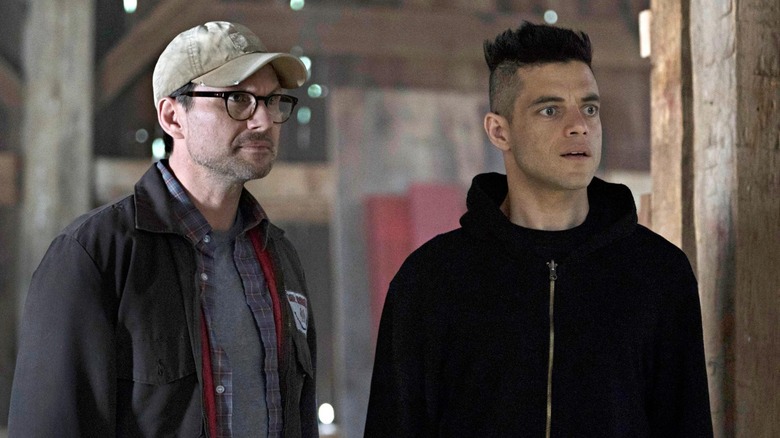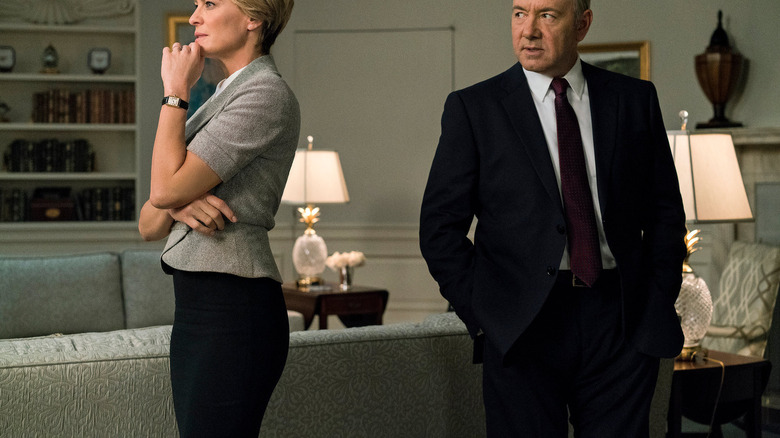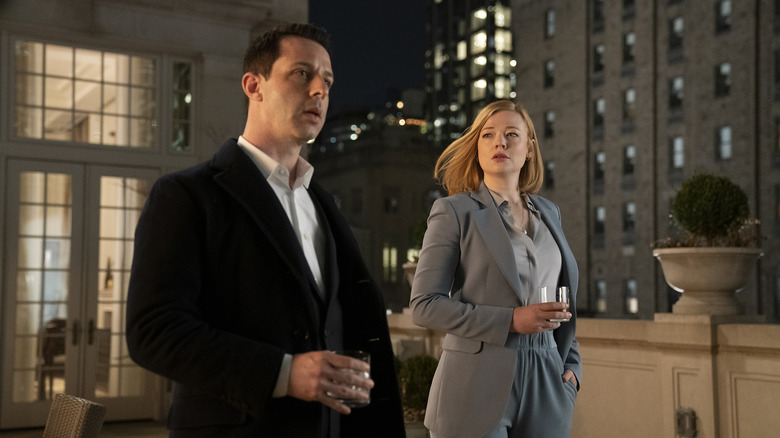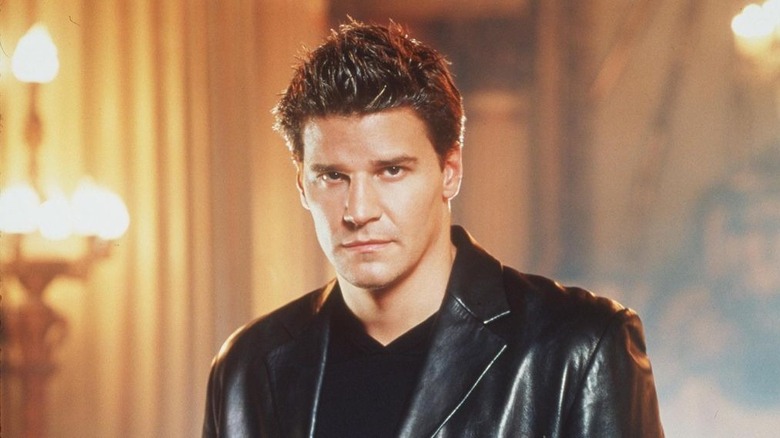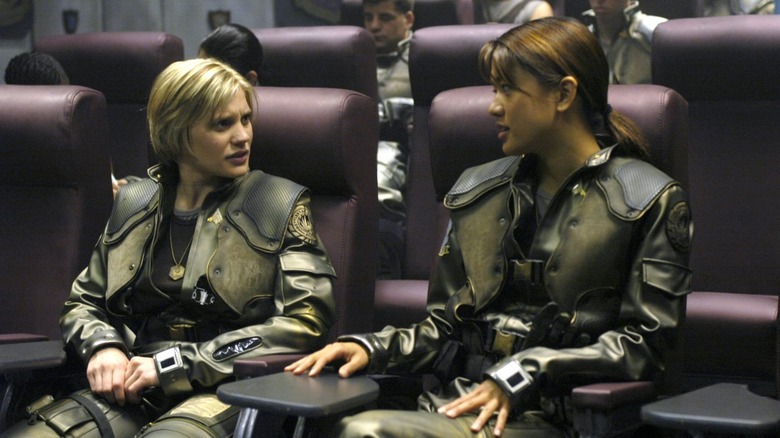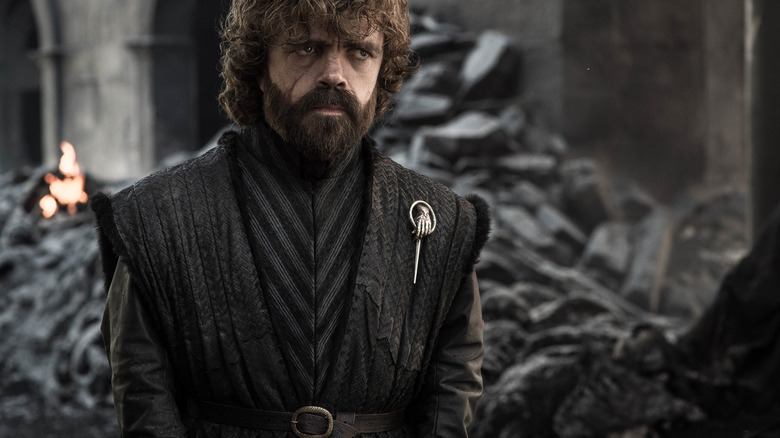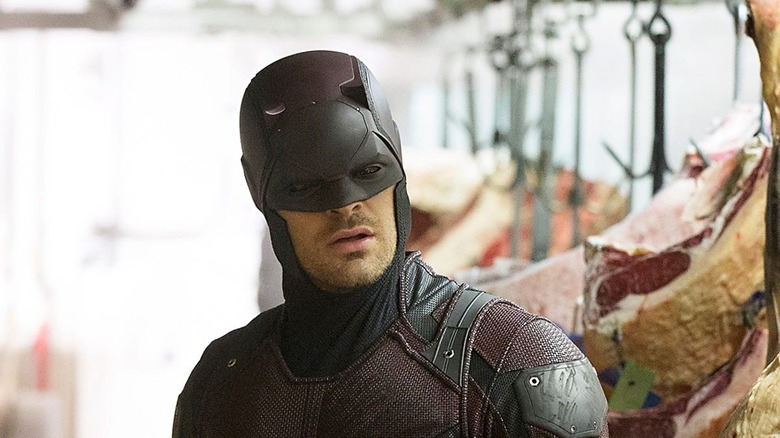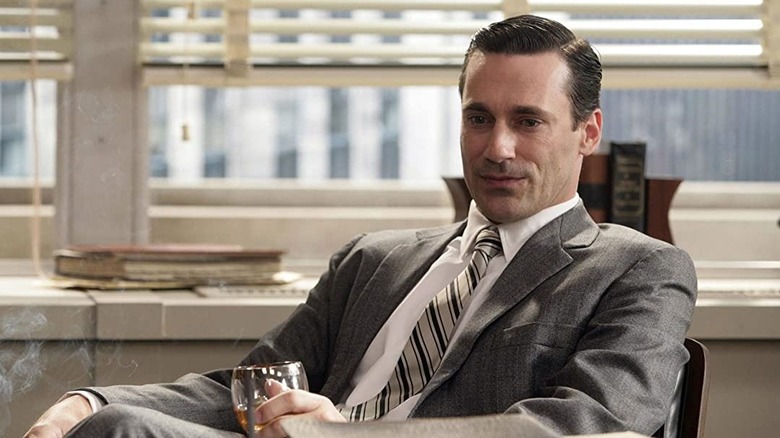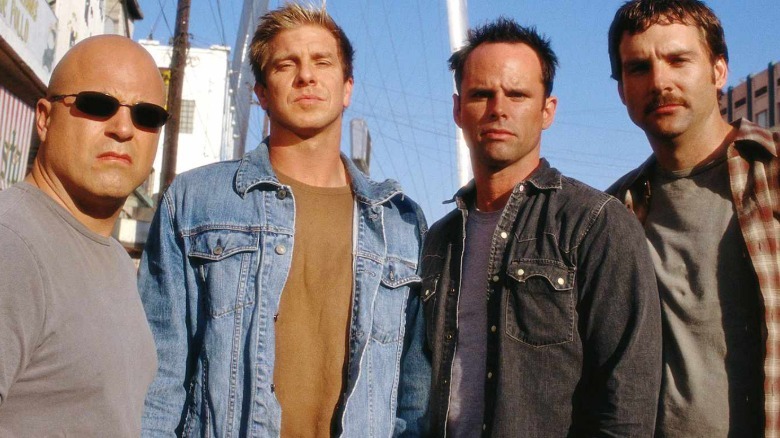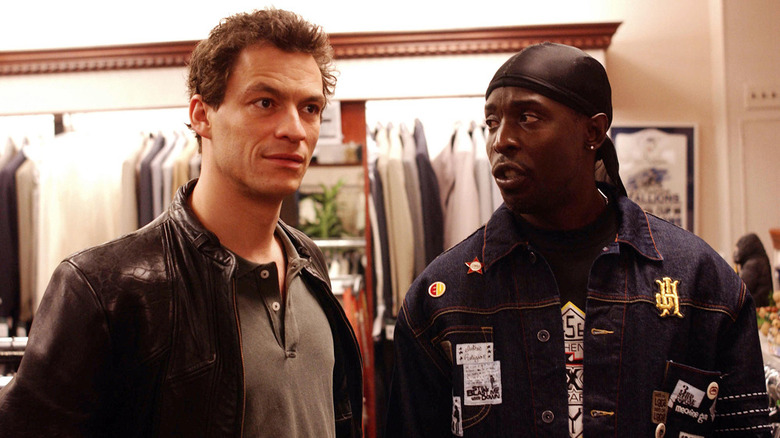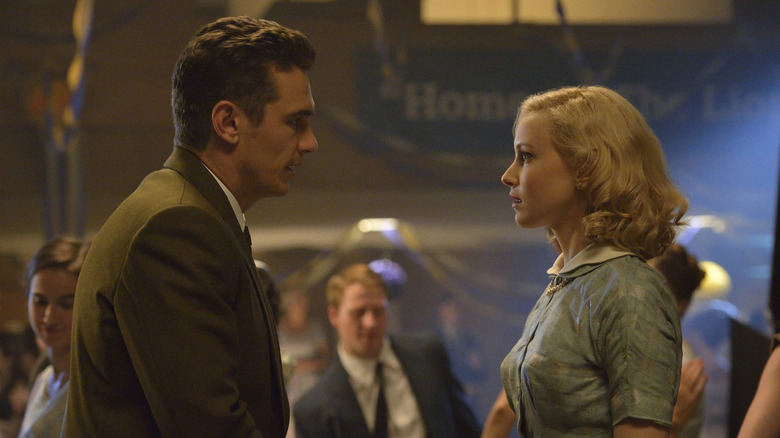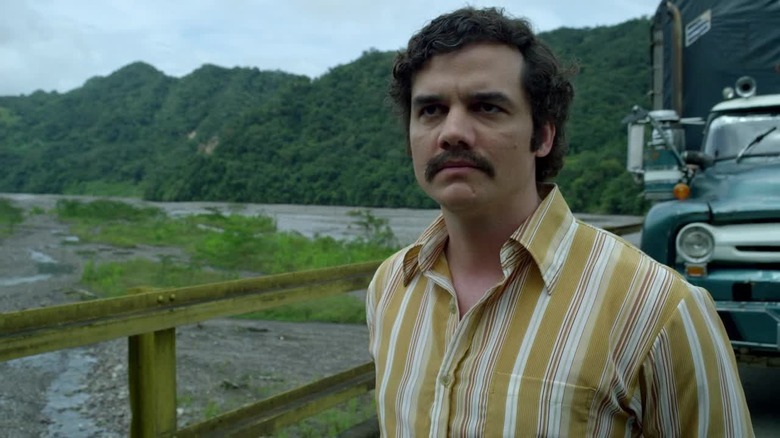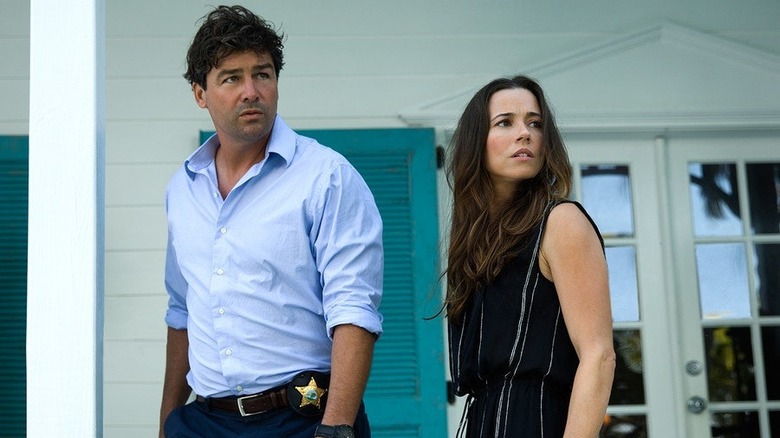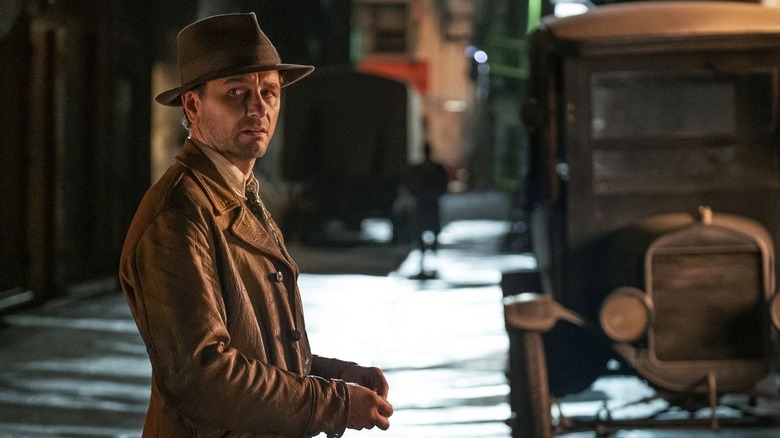15 Shows Like The Sopranos That Will Have You Glued To Your Seat
"The Sopranos" essentially did for television what "The Godfather" did for cinema; it was a foundational text that not only ranks among the most brilliant and beautifully constructed ever made, but is continuously cited for its groundbreaking achievements within the medium. When "The Sopranos" debuted in 1999, there was simply nothing like it. Ambitious long-form storytelling on this scale did not exist on television at the time, and "The Sopranos" continuously kept viewers on the edge of their seats with its frequent twists and turns.
"The Sopranos" solidified HBO's excellence in original programming and laid the groundwork for the "peak TV" of today. Thanks to "The Sopranos" and the shows it inspired, television is now considered to be a form of storytelling that's not only equal, but oftentimes superior to film. Showrunner and creator David Chase justified prolonged viewer interest by crafting creative storylines that explored the true depths of mob boss Tony Soprano (James Gandolfini) and his operations. Gandolfini's sensitive, nuanced performance is one of the greatest pieces of acting ever committed to screen.
If you love "The Sopranos," you should check out these gripping shows, too.
Twin Peaks
In addition to the brilliant writing of David Chase and the excellent performances, one of the reasons "The Sopranos" was so groundbreaking was that it was one of the few television shows that felt fully cinematic. There is a beautiful quality to the craftsmanship of the series, and often the show would experiment with arthouse film techniques to show the interior of Tony's mind. The season two finale "Funhouse," for instance, included visions in which Tony weighed the betrayal of one of his closest allies, and the experimental season five episode "The Test Dream" found him considering his cousin Tony's (Steve Buscemi) loyalty.
Few television shows rise to the same cinematic heights as "The Sopranos," but nearly a decade prior to its debut, "Twin Peaks" set the gold standard for ambitious storytelling on television. At the time it was very rare for such a visionary director to work in television, but "Twin Peaks" was co-created by the brilliant filmmaker David Lynch. Lynch crafted an enticing mystery that continues to provoke questions and theories.
"Twin Peaks" is set within a small town of the same name where the high school's prom queen, Laura Palmer (Sheryl Lee) is found dead and wrapped in plastic. The idiosyncratic FBI Agent Dale Cooper (Kyle MacLachlan) is dispatched to investigate and encounters the strange and unusual residents of the community, as well as unexplained supernatural events.
Mr. Robot
Suspense and anxiety were a large reason why "The Sopranos" was so gripping, as the characters were constantly in danger and many shocking deaths occurred over the duration of the series. There was no guaranteed safety for any of the show's characters, and some of the most emotional episodes in the series are ones in which long-time cast members are forced to depart, such as the heartbreaking "Long Term Parking." There were also many shocking reveals. For example, Christopher Moltisanti (Michael Imperioli) begins to gradually piece together the true backstory of his father Dickie and his death.
The USA Network thriller series "Mr. Robot" is one of the most gripping television shows in recent memory. Similar to Chase, showrunner and creator Sam Esmail utilized experimental filmmaking techniques to create a visually and tonally distinct series. "Mr. Robot" follows the data security programmer Elliot Alderson (Rami Malek), who works for the conglomerate E Corp, which he refers to as "Evil Corp." Elliot secretly works as a Robin Hood-esque hacker exposing corrupt individuals, and he's recruited by a mysterious hacking society named fsociety and their enigmatic leader, Mr. Robot (Christian Slater), who want to hack E Corp and erase the world's debt.
House of Cards
While "The Sopranos" is often a violent show that features many gripping action setpieces, at its heart, it's a political drama about the difficult decision-making process and consideration that goes into choosing and maintaining leaders. Tony did not rise to prominence purely through his family name, as he had to contend with rivals for his position of influence and earn respect. The relationships between different mafia organizations within the area are fragile, and Tony must be wary of upsetting any alliances or preexisting deals that could jeopardize the stability of his operation.
The political maneuvering that is so present on "The Sopranos" is central to "House of Cards." Similar to "The Sopranos," "House of Cards" was a game-changer in how it was presented to viewers, as was the first-ever Netflix original series. "House of Cards" inspired fans to sit down and watch extended binges of new episodes thanks to its gripping narrative and frequent twists. Just as "The Sopranos" explored the inner workings of the mafia, "House of Cards" showed the behind-the-scenes wheeling and dealing within modern politics.
Succession
For as gut-wrenchingly emotional and brutally violent as "The Sopranos" could get, it was often a hilarious series with a great sense of humor. Tony was a complex character who often used jokes as a defense, and his playful interactions with the men under his control often inspire hilarious conversations. Some of the show's best episodes, such as "Pine Barrens," seamlessly combine comedy and drama.
Few shows currently on the air manage this balance between comedic and dramatic influences as well as another HBO series, "Succession." The financial family drama is similar to "The Sopranos" in that the characters are engaging and somewhat sympathetic, despite the fact that they do monstrous things that harm a lot of innocent people. "Succession" has some of the best one-liners and insults, but the humor doesn't detract from the brilliantly written tragedy of a family that has always failed to communicate and express their emotions to one another.
The series follows aging media mogul Logan Roy (Brian Cox) as his leadership is put into question, and the future of his empire Waystar RoyCo is in jeopardy. Logan's influence is sought by his four children: Former drug addict and loyal company man Kendall (Jeremy Strong), wisecracking scoundrel Roman (Kiernan Culkin), politically savvy tactician Shiv (Sarah Snook), and utter goofball Connor (Alan Ruck).
Angel
"The Sopranos" was a fascinating series because its characters did not strictly fit into the classic categories of good or evil. Tony does many terrible things throughout the show, but he's also a sensitive man who is shown to be loving towards his wife, Carmela (Edie Falco), and his children. Tony's sensitivity comes out prominently during his therapy sessions with Dr. Melfi (Loraaine Bracco), in which he reveals personal details that he wouldn't dare share with any other close confidant.
The fantasy adventure series "Angel" explored a similarly nuanced character who evolves throughout the series's five-season run. David Boreanaz's titular character, a vampire cursed with a soul, was first introduced on the young adult series "Buffy the Vampire Slayer," but departed from the main series cast at the end of the third season. The spinoff reimagines Angel as a detective in Los Angeles, where he attempts to atone for the sins of his past by helping others in need and dealing with supernatural threats. Angel is haunted by visions of his past cruelty, and his evil alter ego Angelus threatens to emerge.
Battlestar Galactica
"The Sopranos" took a somewhat unexpected take on the well-established mafia genre. It's not as if casual viewers were entirely unaware of the inner workings of criminal underworlds, as cinematic classics like "The Godfather," "Goodfellas," and "The Untouchables" had been exploring similar territory for decades. However, taking a prominent mob boss and depicting him as a family man was a new take on the genre, one which made "The Sopranos" feel unique. While the show would make reference to "The Godfather" and "Goodfellas," it quickly established itself as a future classic in its own right.
The original 1978 science fiction series "Battlestar Galactica" was little more than a cheaply produced, campy action series made to cash in on the recent success of "Star Wars." However, the 2004 reboot took the universe in a completely unexpected direction. The series was reimagined as a political drama about the fragility of maintaining civilization during the constant threat of an invasion from lethal aliens known as Cylons.
Game of Thrones
"The Sopranos" is all about the wheeling and dealing that goes into holding a dangerous organization together. Each decision has to be meticulously planned as Tony and his allies weigh the course of action that will be best for the family's future. Tony is ruthless, but he's also a savvy strategist who tries to read his enemies' minds and analyze their plans. His intelligence makes him a compelling series lead, and he's accompanied by a cast of characters that are equally as complex.
"Game of Thrones" is essentially a political thriller that just so happens to take place in a mystical fantasy realm. The great source material of George R.R. Martin's novels created the perfect template for a fable about the all-consuming nature of war and the power struggles that result as the families of Westeros vie for control of the Iron Throne. It's ironic that as this conflict plays out, the characters are ignorant to the looming threat of the undead Whitewalkers and their leader, The Night King.
Daredevil
Comic book storytelling grew grittier throughout the development of the medium, and different superheroes had diverse depictions that suited them for different types of adaptations. While some superhero characters are inherently sillier and deserve a more light-hearted approach, other characters are more bound to reality and benefit from a dark and gritty tone. Blind lawyer Matthew Murdock and his superhero alter-ego "Daredevil" is often the star of darker, crime-based storylines, many of which have way more in common with "The Sopranos" than they do "Spider-Man" or "The Incredible Hulk."
The Netflix series adaptation "Daredevil" fulfilled the character's proper legacy by setting him within a realistic world. Charlie Cox gave a brilliant performance as the central hero, whose childhood loss of his father and prominent Catholic upbringing granted him with a strong sense of morality. Murdock doesn't face off against supernatural threats, but rather the crime boss Wilson Fisk (Vincent D'Onofrio), also known as Kingpin.
Mad Men
One of the most impressive things about "The Sopranos" is how it justified the show's prolonged length without dulling viewer interest. Not every show can run for six seasons and continue to be interesting throughout, but "The Sopranos" kept fans engaged by putting the characters in constant danger and peeling back Tony's psychological layers. Tony is hardly the same man in the series pilot as he is by the finale, as he's changed and desensitized by the events of the show. Key flashbacks to his childhood helped Gandolfini flesh out his performance.
The AMC period piece "Mad Men" was similarly gripping throughout its run, as it ran for seven brilliant seasons and concluded perfectly with the finale "Person to Person." The series is set in the 1960s, and follows the inner workings and employees of the fictional advertising company Sterling Cooper and its charismatic creative director, Don Draper (Jon Hamm). Like Tony, Don is a fascinating character who holds many mysteries beneath his outward persona. It's revealed that he has stolen his identity after growing up penniless and surviving a traumatic wartime experience.
The Shield
Tony Soprano completely characterizes the classic anti-hero trope. Against their better judgment, fans may be rooting for Tony to win the day even though he's continuously proven to be a violent, extreme, and often cruel character who takes advantage of others and puts both his family and friends at risk. When discussing the great anti-heroes of modern television, Michael Chiklis' Vic Mackey, of "The Shield," also deserves to be in the conversation.
Mackey is the head of the Strike Team division of the Los Angeles Police Force, and specializes in raids and dangerous operations that he oversees with an elite and loyal team. Mackey is known for his brutality, as he will emotionally and physically torment his witnesses in order to get them to cooperate, and he often conflicts with the department's leadership. However, Mackey's methods are sometimes necessary in order to find a solution during a race against time; during the pilot episode, he is called in to question a child predator in order to determine the location of a kidnapped young girl. This is the same episode in which he brutally slays a fellow cop, so it's safe to say viewers certainly got to see the range of actions Mackey is capable of, right off the bat.
The Wire
"The Sopranos" explores the intersections between various institutions that involve the mafia; at various points, Tony must contend with local police, some of which he paid off, and the looming threat of an FBI investigation and the fear that one of his close allies could be an undercover informant. Later seasons also incorporated the influence of Hollywood, as Christopher worked to get his screenplay produced and establish himself as an actor. There is also a news media presence that paints Tony in a new light and gives him a different public reputation.
David Simon's ambitious HBO series "The Wire" debuted only a few short years after "The Sopranos," and was as equally important in showing the possibilities of cinematic storytelling on television. "The Wire" is Shakespearean in its scope, exploring the Baltimore drug scene from the perspective of various players, and giving empathy to them all.
The first season focuses on the cops' investigation and wiretapping of the Barksdale drug ring and other operations. Season two took the drama to the city ports and explored the perspective of dock workers. Season three explored city politics and the corruption of legacy leaders, focusing on the mayoral campaign of the charismatic young politician Tommy Carcetti (Aidan Gillen). Season four followed several young schoolboys who are drawn into a life of crime. Season five explored the media's coverage of city crime, and how a false story about a serial killer took root.
11.22.63
There is an element of "The Sopranos" that involves a race against time. Tony is frequently trying to avoid an FBI investigation, and the sixth season, in particular, is very chaotic. All-out war is breaking out between the crime families, and Tony must quickly determine the path forward in order to establish his family's survival.
The Hulu miniseries "11.22.63" explores a frantic mission by a hero who faces a similar ticking time clock. Based on the novel by Stephen King, the show follows high school English teacher Jake Epping (James Franco), who meets a mysterious man named Al Templeton (Chris Cooper), who suggests he holds a gateway to a different time period. Al is able to transport Jake back to the 1960s, and the two decide to stop the assassination of U.S. President John F. Kennedy in 1963. Jake finds himself comfortable within the new environment and falls in love with a kind-hearted fellow teacher by the name of Sadie Dunhill (Sarah Gadon).
Narcos
"The Sopranos" explores the complex ins and outs of a world that viewers may be familiar with. Mafia films are popular and certainly give one perspective on the crime world, but "The Sopranos" went far more in-depth in its exploration of the daily lives of Tony's family and team. The drug cartel landscape and prominent drug-runners that occupy it have been frequently depicted in films and media, but the Netflix series "Narcos" did an excellent job at exploring the real history behind many of the legends.
The first two seasons of "Narcos" explore the rise and fall of Pablo Escobar (Wagner Moura) as he expands his Columbian operation and becomes a prominent political leader. Escobar is hunted down by DEA Agents Steve Murphy (Boyd Holbrook) and Javier Pena (Pedro Pascal). The third season continues Pena's story as he investigates the Cali cartel that grows in the wake of Escobar's death. The series expanded with the spinoff "Narcos: Mexico," which follows the simultaneous rise of Mexican drug lord Félix Gallardo (Diego Luna).
Bloodline
Family is a cornerstone theme on "The Sopranos;" Tony prizes the loyalty to his bloodline above all else. Part of the reason that he chooses Christopher Moltisanti as his heir apparent is that he is a relative, and Tony must deal with his scheming Uncle Junior (Dominic Chianese), his overbearing mother (Nancy Marchand), and his obnoxious sister Janice (Aida Turturro). Tony and Carmelas' marriage takes many upwards and downwards spirals, and Tony struggles to connect with his daughter, Meadow (Jamie Lynn-Sigler), and son, A.J. (Robert Iller).
The integration of family drama and crime made "The Sopranos" compelling, and another great series that weaves those same bonds is the Netflix drama "Bloodline." The series follows various grown siblings who gather at a beach resort for the 45th wedding anniversary of their parents, Robert (Sam Shepard) and Sally Rayburn (Sissy Spacek). Their eldest son John (Kyle Chandler) is a local police detective and highly suspicious of his brother Danny (Ben Mendelsohn), the black sheep of the family. Chaos ensues.
Perry Mason
"The Sopranos" was unafraid to show disturbing images and paint the streets of New Jersey in gritty, grimy strokes. It was not a series for the faint of heart, as certain characters like Ralph Cifaretto (Joe Pantoliano) and Phil Leotardo (Frank Vincent) are particularly vile. It's one thing to show violence simply to shock the viewer, but "The Sopranos" justified its more intense elements by showing their consequences, and telling a story that necessitated the heavy approach.
HBO's reboot of "Perry Mason" is far more intense than the original 1950s series that some viewers may have been familiar with. The series follows the titular criminal lawyer (Matthew Rhys), who sidelines collecting gossip on Hollywood figures. Mason decides to take on a baffling child murder that has sent the city into a state of paranoia, and defends the child's accused mother, Emily Dodson (Gayle Rankin), when it's assumed she is a murderer.
